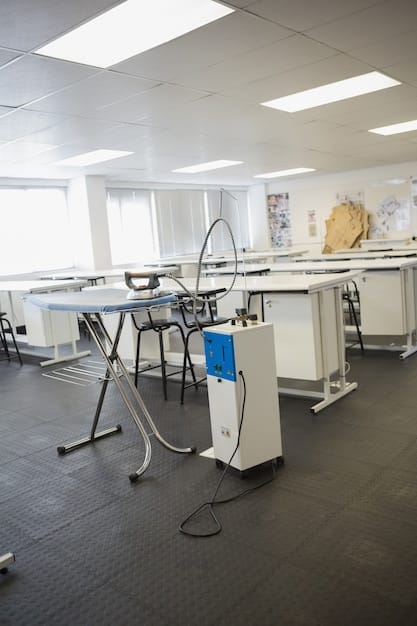Biotech Incubators vs Accelerators: Choosing the Right Program

Biotech startup incubators focus on early-stage development with resources like lab space and mentorship, while accelerators are short-term programs providing funding, networking, and intensive business development, guiding companies towards rapid growth and investor readiness; the best option depends on the company’s stage and needs.
Navigating the early stages of a biotech startup can be challenging, and selecting the right support system is crucial. Understanding the differences between biotech startup incubators vs. accelerators: which program is best for your company? can significantly improve your chances of success.
Understanding Biotech Startup Incubators
Biotech startup incubators are designed to nurture early-stage companies, providing a supportive environment where ideas can develop into viable businesses. These programs offer resources and mentorship to help startups navigate the initial hurdles of launching a biotech venture.
What Incubators Offer
Incubators commonly provide physical resources such as lab space, equipment, and office facilities. These shared resources reduce the financial burden on startups, allowing them to focus on research and development.
Mentorship and Guidance
A key advantage of incubators is access to experienced mentors who can provide guidance on business strategy, regulatory compliance, and fundraising. This mentorship is invaluable for navigating the complexities of the biotech industry.
- Access to Lab Space: Reduces overhead costs by providing shared lab facilities.
- Networking Opportunities: Connects startups with industry experts and potential investors.
- Educational Resources: Offers workshops and seminars on relevant topics.

Ultimately, biotech startup incubators provide a nurturing environment with the necessary resources and mentorship, enabling early-stage companies to focus on innovation and growth.
Exploring Biotech Startup Accelerators
Biotech startup accelerators are intensive, short-term programs focused on rapidly scaling promising startups. Unlike incubators, accelerators provide a structured curriculum, seed funding, and access to a network of investors and industry experts.
The Accelerator Model
Accelerators typically operate in cohorts, with startups participating in a fixed-term program that culminates in a demo day where they pitch to investors. This model is designed to accelerate growth and prepare companies for funding rounds.
Key Benefits of Accelerators
One of the primary benefits of accelerators is the opportunity to secure seed funding in exchange for equity. Additionally, accelerators provide intensive coaching, networking opportunities, and exposure to potential investors.
- Seed Funding: Provides capital to support early-stage development.
- Intensive Coaching: Offers guidance on business development, marketing, and fundraising.
- Investor Network: Connects startups with venture capitalists and angel investors.
In summary, biotech startup accelerators provide a fast-paced environment with funding, mentorship, and networking opportunities, aiming to accelerate growth and prepare startups for investment.
Key Differences Between Incubators and Accelerators
Understanding the distinct differences between incubators and accelerators is essential for choosing the right program for your biotech startup. These differences span several areas, including the stage of the company, the duration of the program, and the resources provided.
Stage of Development
Incubators are typically geared towards very early-stage startups, often those still in the idea or research phase. Accelerators, on the other hand, target companies that have a prototype or early product and are ready to scale.
Program Duration and Structure
Incubator programs can last for several years, providing ongoing support as the company grows. Accelerators are short-term, typically lasting three to six months, with a structured curriculum and intensive mentorship.
- Incubators: Long-term support for early-stage ideas.
- Accelerators: Short-term, intensive programs for rapid growth.

To summarize, the key differences between incubators and accelerators lie in the stage of the startups they serve, the duration and structure of the programs, and the focus of the resources provided.
Which Program is Right for Your Biotech Startup?
Choosing between a biotech incubator and an accelerator depends on your startup’s current stage, needs, and goals. Evaluating these factors can help you determine which program is the best fit.
Assessing Your Startup’s Stage
If your startup is still in the research or development phase, an incubator may be the best option. If you have a working prototype and are ready to scale, an accelerator might be more suitable.
Defining Your Goals
Consider your long-term goals. If you need ongoing support and a nurturing environment, an incubator can provide that. If you’re looking for rapid growth and access to investors, an accelerator is a better choice.
Making the Decision
Ultimately, the decision between an incubator and an accelerator should be based on a clear understanding of your startup’s needs and goals. Evaluate the resources, mentorship, and networking opportunities offered by each program to determine the best fit.
In conclusion, the right program depends on your startup’s stage and goals; incubators offer long-term support for early-stage ideas, while accelerators provide intensive programs for rapid growth.
Evaluating Costs and Benefits
When considering biotech startup incubators and accelerators, it’s crucial to evaluate the associated costs and benefits. This assessment can help you make an informed decision that aligns with your startup’s financial capabilities and strategic goals.
Cost Considerations
Incubators may charge fees for lab space, equipment, and other resources. Accelerators often take equity in exchange for seed funding and participation in the program. Understanding these financial implications is vital.
Benefit Analysis
Weigh the potential benefits of each program. Incubators offer access to essential resources and mentorship, while accelerators provide funding, intensive coaching, and investor connections. Determine which benefits are most valuable to your startup.
- Financial Costs: Consider fees, equity, and other financial obligations.
- Strategic Benefits: Evaluate access to resources, mentorship, and networking opportunities.
Overall, a thorough cost-benefit analysis is essential when choosing between biotech startup incubators and accelerators, ensuring the decision aligns with your startup’s financial capabilities and strategic objectives.
Success Stories and Case Studies
Examining success stories and case studies of biotech startups that have participated in incubators and accelerators can provide valuable insights. These examples illustrate the potential impact of each program and offer lessons for aspiring entrepreneurs.
Incubator Success Stories
Many biotech startups have found success through incubator programs. These incubators provided access to lab space, mentorship, and resources that were critical for early-stage development.
Accelerator Success Stories
Accelerators have also played a significant role in the success of several biotech startups. These programs offered funding, intensive coaching, and access to investors, helping startups rapidly scale and secure funding rounds.
Lessons Learned
The experiences of these startups offer valuable lessons for entrepreneurs considering incubators or accelerators. Understanding the challenges and opportunities associated with each program can inform your decision-making process.
In short, success stories and case studies demonstrate the potential impact of both incubators and accelerators, providing valuable lessons for biotech startups.
| Key Point | Brief Description |
|---|---|
| 🧪 Incubators | Offer resources, space, and mentorship for early-stage biotech startups. |
| 🚀 Accelerators | Provide funding, networking, and intensive business development for rapid growth. |
| 🎯 Key Differences | Stage of development, program duration, and resources provided vary significantly. |
| 💰 Costs & Benefits | Evaluate fees, equity, resources, and networking when making a decision. |
Frequently Asked Questions
▼
The main purpose of a biotech startup incubator is to provide early-stage companies with the resources, mentorship, and support they need to develop their ideas into viable businesses, fostering innovation and growth.
▼
A biotech startup accelerator helps companies grow by providing seed funding, intensive coaching, and access to a network of investors and industry experts, accelerating their development and preparing them for funding rounds.
▼
Incubators typically offer resources such as lab space, equipment, office facilities, mentorship, educational resources, and networking opportunities to support the development of early-stage biotech startups.
▼
Accelerator programs usually last for a short-term period, typically ranging from three to six months, providing intensive coaching and rapid business development to participating biotech startups.
▼
A startup should consider its current stage of development, long-term goals, financial needs, and the specific resources and mentorship offered by each program to determine the best fit between incubator and accelerator.
Conclusion
Choosing between a biotech startup incubator and an accelerator is a critical decision that can significantly impact your company’s trajectory. Understanding the nuances of each program, evaluating your startup’s specific needs, and weighing the costs and benefits will guide you toward the best fit, setting the stage for growth and success in the competitive biotech landscape.





